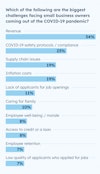Published
September 13, 2021
The Q3 2021 MetLife and U.S. Chamber of Commerce Small Business Index (SBI) finds that small business owners are increasingly cautious when it comes to plans for hiring and investing. The poll taken July 16 – 30, 2021, and released this week by the U.S. Chamber of Commerce and MetLife also found that small business owners see generating revenue as their biggest post-pandemic challenge.
Pulling Back on Future Plans
The survey shows that plans for future investment are plateauing. Almost half (48%) of small business owners say they plan to keep investments in their business the same over the next year, 11 percentage points more than earlier this year in Q1 (37%). Fewer (29%) plan to increase investment, a drop from 35% in Q1.
Also, small business owners who plan to keep their current staffing levels over the next year (as opposed to hiring more) is at 62%, an increase from 52% last quarter.
Optimism About the Present
At the same time, small business owners are optimistic about their current business health and recognize improvement in the overall economy. More than half (55%) of small business owners believe the health of their business is good, two-thirds (66%) believe their cash flow situation is good, and 58% expect their revenue to increase in the next year.
One in three (34%) say the U.S. economy is in good health—higher than any point since the pandemic began. However, even here business owners show caution as the improving views come from more businesses saying the economy is “somewhat good.” Just 7% say it is “very good.”
The Biggest Challenge Facing Small Business: Generating Revenue
As small businesses look to put the pandemic behind them, their biggest challenge is generating revenue. Although 58% expect their revenue to increase in the next year, 34% cite revenue as their biggest challenge right now.

Inflation/higher costs are also proving tough to manage: 72% of small businesses said managing higher costs due to inflation is difficult. 73% said rising prices have had a significant impact on their business in the past year.
Supply chain challenges are another top concern. This quarter, 61% of small business owners say it is difficult for them to manage disruptions to their supply chains (80% for retail businesses). Sixty-two percent say their supply chain has been dramatically disrupted during the pandemic.
Additionally, some small business owners are struggling to find workers to fill open jobs. Half (50%) say it is difficult to recruit and hire enough employees to fill open positions and compete for talent with other small (53%) and large (57%) businesses in their area. While 11% of small businesses overall cite this concern, 18% of larger small businesses (20-499 employees) noted it.
What the Experts Are Saying:
“Limiting large-scale lockdowns and government-mandated business closures kept Main Street open, and paired with rising vaccination rates, small business owners are confident about their future and about the American economy,” said Tom Sullivan, vice president of small business policy at the U.S. Chamber of Commerce. “However, economic momentum has cooled off this quarter as a rise in COVID-19 cases, workforce shortages, and supply-chain woes led to caution among small businesses.”
The Headline Number: Down Slightly This Quarter
The current Small Business Index score is 56.6. This represents a 3.4 point decrease from 60.0 in Q2 2021, but is in line with the beginning of the year when the score was 55.9 in Q1 2021. However, the new score remains below findings before the pandemic: the Index score was 71.7 in Q1 of 2020 based on data collected before the full economic impact of the coronavirus became apparent.

More Key Findings:
- More say minority businesses face unique challenges. Two-thirds (66%) of respondents acknowledge that minority-owned small businesses face more challenges, an increase of 14 percentage points since this was last asked in Q1 2020.
- Most see benefits in diverse hiring practices.Seventy-one percent agree that hiring racially diverse candidates is beneficial for business, and the same percentage agree most businesses should focus on hiring racially diverse employees.
- Most struggle with work-life balance. Fifty-two percent of small business owners say they struggle with work-life balance; 51% say they struggle to spend enough time with family outside of work.
For more findings from this quarter, please visit https://www.uschamber.com/sbindex/.
About the author

Thaddeus Swanek
Thaddeus is a senior writer and editor with the U.S. Chamber of Commerce's strategic communications team.





